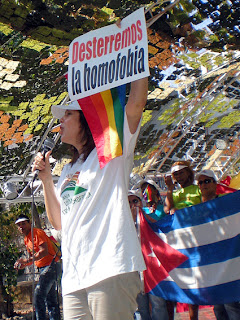 |
| Mariela Castro at Cuba IDAHO rally |
Mariela Castro Espín, the daughter of Cuban President Raúl Castro and a leader for LGBT rights on that island, told the 20th World Congress for Sexual Health, held in the Scottish city of Glasgow 18 June, that Cuba’s Communist Party may soon be ready to recognise gay and lesbian rights, even though her father has cautioned her that the time may not yet be ripe.
“I’ll be frank with you. My father, with all his experience in outlining strategies, and getting them implemented, has told me one first has to create the right conditions - and Cuban society lacks them in many areas," she said.
"When the Revolution declared itself socialist after the 1961 Bay of Pigs invasion, people took up arms to defend it, hardly knowing what socialism was exactly. It seems a contradiction, but what I’m trying to say is that, in this macho culture, we’ve made a lot of progress regarding women’s rights."
"So I’d tell my father: why don’t we do the same thing with these issues? But he’d say: look, some things have such deeps roots in our culture, that you’ll face a lot of resistance unless you sort out some other things first. That’s why it’s necessary to wait until the party conference in January [2012] and make progress informing the population with the help of the media. That way we’ll get things ready in order to get a good result."June 17 Cuba supported the historic resolution for LGBT rights at the United Nations Human Rights Council. At the UN, Cuban activists had previously scored an abstention as a victory.
The official blog of the Centro Nacional de Educación Sexual (National Center for Sexual Education, CENESEX), the organisation which Mariela Castro Espín heads, said:
"Cuba’s affirmative vote shows the political will of our Party and State to eliminate all forms of discrimination that unfortunately still persist in Cuban society."
 |
| LGBT rights march in Santiago |
Alejandro Armengol, a Miami-based commentator and veteran observer of Cuban politics, says that the change in attitudes at the UN demonstrates: "how forceful the gay movement in Cuba has become."
"There are times when Cuba uses gays, or certain gays, especially writers and artists, to show how things have gotten better," says Armengol.
"That’s how they throw the focus off matters of censorship and repression, for sure. But that can’t erase that there’s real progress in this area, sometimes even more than the government bargained for."Cuba's history on LGBT rights includes anti-gay statements by Fidel Castro, sanctioned anti-gay persecutions and purges, and labor camps in the 1960s created specifically for LGBT people (which Fidel has since apologised for). This period was dramatically documented by the 1980s documentary "Improper Conduct", and by the renowned author Reinaldo Arenas in his 1992 autobiography, Before Night Falls, as well as his fiction, most notably The Color of Summer and Farewell to the Sea. The criminal laws against homosexuality were gradually liberalised, starting in 1979.
Continuing police harassment in Cuba, including arrests, has been reported on gay Cuban blogs, particularly that of the Reinaldo Arenas Memorial Foundation.
Herb Sosa, president of Unity Coalition, a Latino LGBT organization based in Miami that has provided materials and resources to LGBT groups, has accused the Cuban government of engaging in extrajudicial executions.
Ms Castro has made the fight against homophobia in Cuba a personal struggle, giving countless talks and interviews.
"Prejudices are still deeply rooted in our culture and in our history as a nation. Finding new ways to change the reality of such views is very hard," she said.
"What I try to do is to dismantle prejudices and offer alternative perspectives on the sexual reality of human beings. Making progress in these areas, especially in those of gender and equal women’s rights, has helped us make progress in respecting sexual diversity and gender identity."


No comments:
Post a Comment